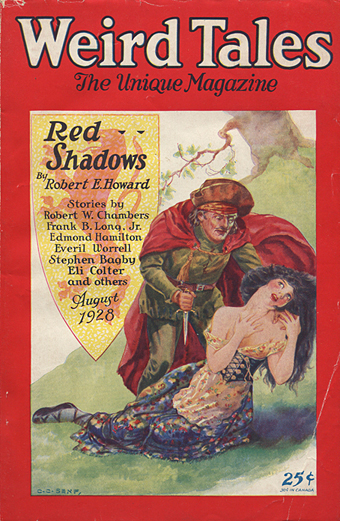
Cover illustration by CC Senf.
In her mind the queen Nitocris was seeing a ghastly picture. It was the picture of a room of orgy and feasting suddenly converted into a room of terror and horror, human beings one moment drunken and lustful, the next screaming in the seizure of sudden and awful death. If any of those present had been empowered to see also that picture of dire horror, they would have clambered wildly to make their escape. But none was so empowered.
Everyone today will be marking the Tennessee Williams centenary by noting his theatre work, of course, or his subversive celebration of outsiders and, yes, the gays. I’ll confine myself to reminding people that Williams’ first published work was a short story entitled The Vengeance of Nitocris in Weird Tales for August 1928, written when he was only 17. The story reads like the work of a teenager but editor Farnsworth Wright evidently enjoyed an atmosphere of lurid Egyptian melodrama which you can appraise for yourself here. Also in this issue was the debut appearance of Robert E Howard’s Solomon Kane, and The Demoiselle d’Ys by Robert Chambers. Seeing the name Nitocris I have to wonder whether Williams chose it after reading HP Lovecraft who used the name twice in earlier stories published in the same magazine, Imprisoned With the Pharaohs (1924) and The Outsider (1926). That last piece was one of Lovecraft’s most popular tales, and it’s easy to imagine its grotesque parable of alienation making an impression on a would-be writer who, as a gay youth, would have looked upon himself as another kind of outsider.
Previously on { feuilleton }
• The King in Yellow

Williams in Weird Tales? Another notch on the scorecard for each.
Coincidentally, guess whose excerpts from The Cutting Room Floor have been accepted by Weird Tales magazine?
Once again, I have you to thank for urging me to submit and for letting me drop your name.
It’s fascinating, isn’t it? You seldom hear Weird Tales mentioned in a literary context despite Lovecraft being ushered into the canon of American writers. HPL had a story in the issue that followed this, and in many of the earlier ones. Tennessee Williams would have been one of the first people to read The Call of Cthulhu.
Congratulations on getting into WT yourself!